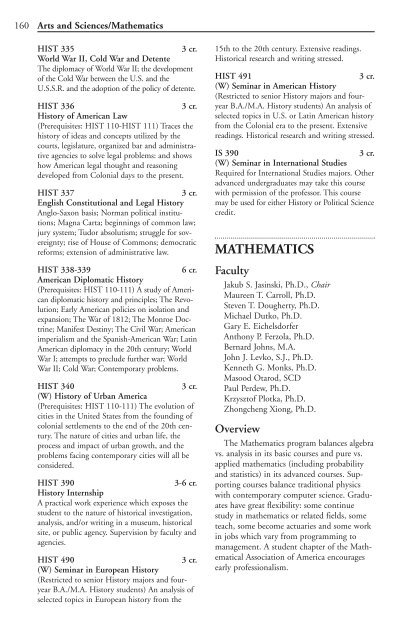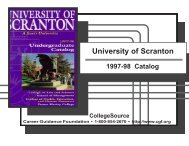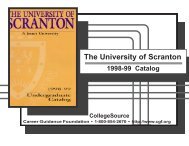2003-2004 - The University of Scranton
2003-2004 - The University of Scranton
2003-2004 - The University of Scranton
Create successful ePaper yourself
Turn your PDF publications into a flip-book with our unique Google optimized e-Paper software.
160 Arts and Sciences/Mathematics<br />
HIST 335 3 cr.<br />
World War II, Cold War and Detente<br />
<strong>The</strong> diplomacy <strong>of</strong> World War II; the development<br />
<strong>of</strong> the Cold War between the U.S. and the<br />
U.S.S.R. and the adoption <strong>of</strong> the policy <strong>of</strong> detente.<br />
HIST 336 3 cr.<br />
History <strong>of</strong> American Law<br />
(Prerequisites: HIST 110-HIST 111) Traces the<br />
history <strong>of</strong> ideas and concepts utilized by the<br />
courts, legislature, organized bar and administrative<br />
agencies to solve legal problems: and shows<br />
how American legal thought and reasoning<br />
developed from Colonial days to the present.<br />
HIST 337 3 cr.<br />
English Constitutional and Legal History<br />
Anglo-Saxon basis; Norman political institutions;<br />
Magna Carta; beginnings <strong>of</strong> common law;<br />
jury system; Tudor absolutism; struggle for sovereignty;<br />
rise <strong>of</strong> House <strong>of</strong> Commons; democratic<br />
reforms; extension <strong>of</strong> administrative law.<br />
HIST 338-339 6 cr.<br />
American Diplomatic History<br />
(Prerequisites: HIST 110-111) A study <strong>of</strong> American<br />
diplomatic history and principles; <strong>The</strong> Revolution;<br />
Early American policies on isolation and<br />
expansion; <strong>The</strong> War <strong>of</strong> 1812; <strong>The</strong> Monroe Doctrine;<br />
Manifest Destiny; <strong>The</strong> Civil War; American<br />
imperialism and the Spanish-American War; Latin<br />
American diplomacy in the 20th century; World<br />
War I; attempts to preclude further war; World<br />
War II; Cold War; Contemporary problems.<br />
HIST 340 3 cr.<br />
(W) History <strong>of</strong> Urban America<br />
(Prerequisites: HIST 110-111) <strong>The</strong> evolution <strong>of</strong><br />
cities in the United States from the founding <strong>of</strong><br />
colonial settlements to the end <strong>of</strong> the 20th century.<br />
<strong>The</strong> nature <strong>of</strong> cities and urban life, the<br />
process and impact <strong>of</strong> urban growth, and the<br />
problems facing contemporary cities will all be<br />
considered.<br />
HIST 390 3-6 cr.<br />
History Internship<br />
A practical work experience which exposes the<br />
student to the nature <strong>of</strong> historical investigation,<br />
analysis, and/or writing in a museum, historical<br />
site, or public agency. Supervision by faculty and<br />
agencies.<br />
HIST 490 3 cr.<br />
(W) Seminar in European History<br />
(Restricted to senior History majors and fouryear<br />
B.A./M.A. History students) An analysis <strong>of</strong><br />
selected topics in European history from the<br />
15th to the 20th century. Extensive readings.<br />
Historical research and writing stressed.<br />
HIST 491 3 cr.<br />
(W) Seminar in American History<br />
(Restricted to senior History majors and fouryear<br />
B.A./M.A. History students) An analysis <strong>of</strong><br />
selected topics in U.S. or Latin American history<br />
from the Colonial era to the present. Extensive<br />
readings. Historical research and writing stressed.<br />
IS 390 3 cr.<br />
(W) Seminar in International Studies<br />
Required for International Studies majors. Other<br />
advanced undergraduates may take this course<br />
with permission <strong>of</strong> the pr<strong>of</strong>essor. This course<br />
may be used for either History or Political Science<br />
credit.<br />
MATHEMATICS<br />
Faculty<br />
Jakub S. Jasinski, Ph.D., Chair<br />
Maureen T. Carroll, Ph.D.<br />
Steven T. Dougherty, Ph.D.<br />
Michael Dutko, Ph.D.<br />
Gary E. Eichelsdorfer<br />
Anthony P. Ferzola, Ph.D.<br />
Bernard Johns, M.A.<br />
John J. Levko, S.J., Ph.D.<br />
Kenneth G. Monks, Ph.D.<br />
Masood Otarod, SCD<br />
Paul Perdew, Ph.D.<br />
Krzyszt<strong>of</strong> Plotka, Ph.D.<br />
Zhongcheng Xiong, Ph.D.<br />
Overview<br />
<strong>The</strong> Mathematics program balances algebra<br />
vs. analysis in its basic courses and pure vs.<br />
applied mathematics (including probability<br />
and statistics) in its advanced courses. Supporting<br />
courses balance traditional physics<br />
with contemporary computer science. Graduates<br />
have great flexibility: some continue<br />
study in mathematics or related fields, some<br />
teach, some become actuaries and some work<br />
in jobs which vary from programming to<br />
management. A student chapter <strong>of</strong> the Mathematical<br />
Association <strong>of</strong> America encourages<br />
early pr<strong>of</strong>essionalism.
















